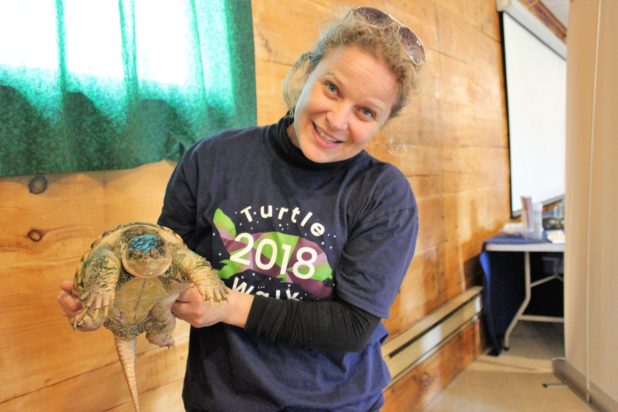Headline News
Turtles help maintain a balanced ecosystem
May 14, 2019

May 14, 2019
By Nate Smellle
As spring takes hold and the temperature rises many species of wildlife can be seen by the roadside as they emerge from the wetlands and woodlands where they spent the winter. At the same time this seasonal return of the wild takes place, traffic throughout North Hastings increases as tourist season kicks in. The timing of this annual influx of vehicles on the roads poses a serious threat for Ontario’s turtles.
To remind people that they will be sharing the roads with turtles until they re-enter hibernation sometime in November, the Think Turtle Conservation Initiative recently hosted its second annual Bancroft Turtle Festival. Turtle Fest organizer Kelly Wallace said the main purpose of the event is to raise awareness of the state of Ontario’s turtles, and the different protection and conservation initiatives people can get involved in. Referring to the Watch 4 Turtle signage campaign as an example of how people can help, she said “There are a lot of people that are really busy, they have family life with a lot going on and not a lot of time, but they buy a sign because they care and they want to do something. This is there way of helping and it means a lot.”
Held at the Bancroft Fish and Game Club on Saturday, May 11, the
event featured a series of informative presentations by Leora Berman of The Land Between and Turtle Guardians; Jess Goslin of Jess’s Animal Adventure and Wendy Baggs of Ontario Turtle Conservation Centre. During Ontario Turtle Conservation Centre education coordinator Wendy Baggs’s presentation, she stressed the dire situation Ontario’s turtles are faced with. Of the eight species of turtles found in Ontario, she said seven of them are currently listed as species-at-risk. Considering the many factors contributing to the decline of turtle populations – habitat loss, road mortality, boat strikes, poaching, predation – Baggs said soon the painted turtle will likely be listed as a species-at-risk as well. As the biggest threat to turtles and main cause of their disappearance, she said humans need to do more to protect them.
“When you see wetlands being filled in for golf courses or a Walmart or any activities going on like that, we need to question it,” Baggs told the crowd.
“If you see an area where a lot of turtles are being hit by cars near a wetland you can get the community together to raise money and buy turtle crossing signs that cost about $50 a piece and you only need two. You can get them from the Toronto Zoo.”
Recognizing that every day species are being driven to extinction all around the world, Baggs said many people feel like they want to help but they don’t know how to. Pointing out that turtles provide valuable ecosystem services, and that they are the fastest disappearing vertebrates on Earth, she said a good way for people to protect biodiversity and the environment is to become active in turtle conservation initiatives. Highlighting the vital role turtles play, Baggs said “Turtles keep our waters clean. They are our caretakers, they are our garborators, they are our scavengers of the wetlands. They eat a lot of dead things that die in the water – a lot of little fish, minnows, insect larvae, tadpoles. They help keep everything in balance. Turtles are the heartbeat of our wetlands and if we lose our turtles it is going to cause a huge ripple effect, because everything is interconnected.”
Being the only turtle hospital in Ontario, Baggs said they need a great deal of resources and funding to allow them to provide care and treatment for the turtles they take in. Last year, she said the centre took in nearly 1,000 injured turtles. With so many turtles in need of assistance, she said events like Turtle Fest are essential to their work to continue.
When an injured turtle is surrendered to the Ontario Turtle Conservation Centre, Baggs said they will do everything possible to care for it and restore its health, so that it can be returned to the wild. To do this though, she said the person who brings the turtle in needs to keep track of exactly where they found the turtle. This is necessary, Baggs said because releasing a turtle into a foreign ecosystem can harm the turtle and disrupt the balance of the ecosystem itself.
Noting that not all the turtles surrendered to the centre survive, and that sometimes people bring in dead turtles, Baggs said their eggs can still be harvested, incubated and raised through the OTCC’s hatchling program. She said turtles that survive but are not healthy enough to be released back into the wild, like those helping her with the presentation, still serve a purpose by becoming ambassadors for turtle conservation and public education.
“Even if you think a turtle is dead, please don’t assume that because turtles can survive the most horrendous accidents,” Baggs said.
“We have had turtles come in that have had their shells cracked severely where you can see tissue and many of them are still alive today. It can take a turtle up to four days to lay there on the road in the sun and actually die. So, if you see a turtle that you think isn’t going to make it, please don’t drive by and just leave it there. Pick it up, give us a call and get it into us, because that turtle may be a female that has eggs.”
Wallace said that the $520 raised at this year’s Turtle Fest from the sale of baked goods, hot dogs/sausages, Watch 4 Turtles sign sales and donations will be donated to the Turtle Guardians Tunnel and Trauma campaign. She said 50 per cent of the funds will go towards the Tunnel campaign to help build turtle tunnel sites throughout central Ontario. The remaining 50 per cent will be used to support the Trauma campaign run by the Ontario Turtle Conservation Centre. Wallace said another local turtle conservation initiative coming up that people can take part in is the second annual Turtle Walk starting at the Post Office in Bancroft’s Riverside Park on June 8.
To get involved with turtle protection and conservation locally contact Kelly Wallace at the thinkturtle@yahoo.com; or via the Think Turtle Conservation Initiative’s Facebook page. For more information on the Ontario Turtle Conservation Centre, or to surrender a turtle to the OTCC visit them online at www.OntarioTurtle.ca or call 705-741-5000.

















